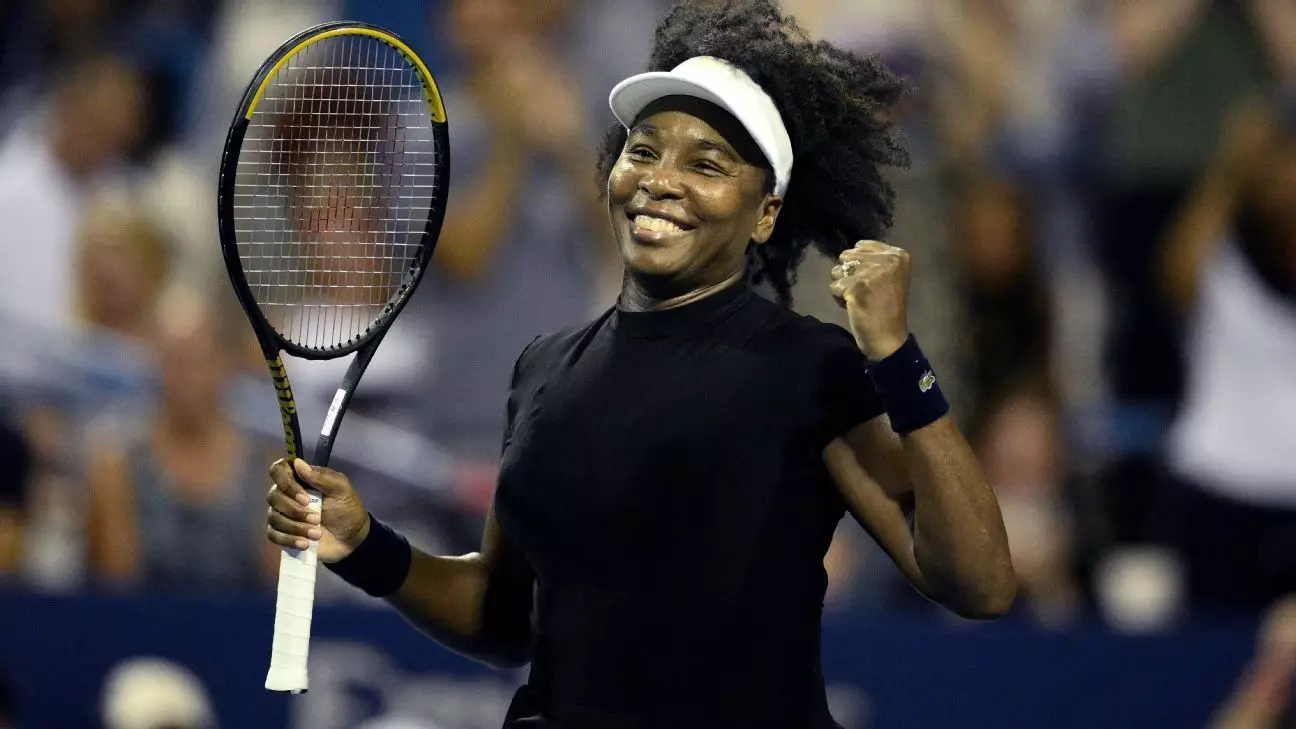Venus Williams’s comeback at the DC Open is more than just a victory; it is a bold proclamation that age is no longer a barrier in professional sports. At 45, stepping onto the court and defeating a rising star 22 years her junior is an act of defiance against the stereotypes that tout athletic prime as strictly youth-bound. Williams’ performance shatters the conventional narrative that aging diminishes competitiveness, serving as an inspiring blueprint for perseverance.
Her journey back from injury and health struggles highlights the importance of resilience. Having undergone surgery to remove uterine fibroids, Williams faced an uncertain future about her ability to compete at a high level. The fact that she managed to not only return but to win a tour-level singles match exemplifies her indomitable spirit. This feat marks her as the second-oldest woman to win at this level, a record only historically surpassed by Martina Navratilova, who achieved the feat at age 47. Such milestones serve as powerful monuments to the human capacity for endurance and tenacity.
The Mental Battle: Navigating Self-Doubt and Confidence
What makes Williams’s victory profoundly impactful isn’t solely her physical skills, but her mental fortitude. She candidly admits to battling doubt and fluctuating confidence throughout her journey. Her reflection on the weekly “leaps” and setbacks in training underscores the mental grind involved in comebacks of this nature. Tennis, often perceived as a purely physical game, is equally a mental duel, a mind game that can tilt the scales towards either despair or victory.
Williams’s honesty about her internal struggles offers a rare glimpse into the psychological landscape of elite athletes facing setbacks. Her persistence shows that internal dialogue—trusting oneself amid uncertainty—is essential to crossing the finish line. Winning despite these mental hurdles demonstrates that resilience is cultivated through repeated effort, patience, and an unyielding belief in one’s capabilities, regardless of age or recent health issues.
Old School Power Meets Modern Resilience
The audience at the DC Open was treated to an electrifying display of power and technique emblematic of Williams’s peak years. Her explosive serves, piercing groundstrokes, and strategic plays spark memories of her rich legacy in tennis. Yet, beyond her raw talent, her tactical approach under pressure highlighted her understanding of game dynamics. She capitalized on key moments, especially during her final service game, where high-velocity serves and precise shot selection sealed her victory.
However, the match also revealed her human side—moments of rust and errors that came with her break from the sport. These imperfections serve to humanize her, showing that resilience is not about being perfect but about persevering despite flaws. Her ability to stay mentally engaged and execute under pressure—facing match points and eventually closing out—speaks volumes about her competitive fire.
Significance Beyond the Individual Achievement
Williams’s return carries symbolic weight beyond her personal resilience; it challenges societal perceptions about aging in sports. In an era obsessed with youth, her success questions the relentless emphasis on physical limits and encourages others to redefine their potential at any stage in life. Her story is a testament to staying engaged, maintaining purpose, and refusing to retire quietly.
This victory also ignites conversations about health, recovery, and longevity. Williams’s openness about her health challenges and the importance of good health underscores a broader message: achievements aren’t solely about results but about the journey and the persistence to overcome obstacles. Her success elevates the narrative that greatness can be sustained through continual effort and adaptive strategies.
Her upcoming matches will undoubtedly face scrutiny, not just for her skill but for what she represents—a beacon of perseverance that defies the stereotypical aging trajectory. In a sport where physicality often takes precedence, Williams’s resilience reminds us that mental strength, strategy, and unwavering determination are equally vital ingredients for excellence.
A Legacy Reaffirmed
While Williams’s career is decorated with Grand Slam titles and historic moments, her latest achievement redefines her enduring legacy. It’s no longer solely about trophies accumulated in the past but about the capacity to inspire future generations with her resilience. She embodies an unwavering fighting spirit that refuses to fade, inspiring athletes and non-athletes alike to challenge their limits and push beyond perceived boundaries.
In a sporting world increasingly focused on quantifiable success, Venus Williams’s triumphant return underscores a timeless truth: true victory resides in the refusal to accept defeat quietly. As she continues her journey, her story becomes a testament to the power of perseverance, challenging us all to see age not as a limitation but as an opportunity for renewal and reinvention.

